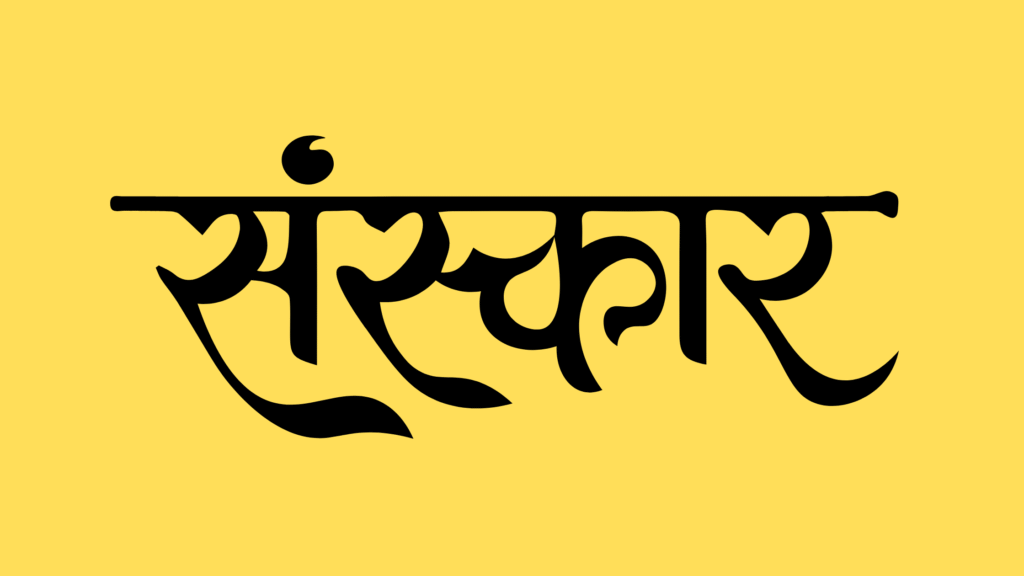
Punsavana Sanskar

Invoking blessings for Divine protection of the foetus for his/her bright futureThe Punsvan Sanskar (Baby Showers) Performed during the period of pregnancy, invoking blessings for Divine protection for his/her bright future.
The sanskar is normally performed when the child is in the form of a foetus – three months old in the mother’s womb. However, it can be performed after three months also. A specific herbal preparation energized in the sacrificial fire of yagya is given to the mother to reach the foetus.
This special ‘treatment’ performed with chanting of mantras during a yagya strengthens healthy development of the gross (physical), subtle (mental) and astral (conscious) body of the child.
Namkaran Sanskar

The ceremony of naming the child – A sacrament for imposing of divinity in newly-born human child. The NamkaranSanskar (Naming Ceremony) of the child is normally performed on the tenth day after birth, but can be performed within a month or whenever name is given to child. It is also a sacrament for imposition of divinity in a newly born child.
During this ceremony, the importance and education is given to parent and other family members that the child should be given the atmosphere where his/her inherent qualities can be awakened and undesirable traces of previous birth can be uprooted.
The child should be named in a manner that is meaningful and reflects a noble quality. During Namkaransanskar parents are encouraged that child is also for society & should be encouraged to be friendly with other family members, neighbour& whole world.
Annaprashana Sanskar

Administering food to the child for the first time – Sowing the seed of purity in Annamaya-Kosh of the child. Performed at the age of 6 months or when a child starts eating solid food for the first time. The food is offered to YagyaBhagvan first and then given to the child.
The education for eating leftovers of yagya means sacrifice for the animal kingdom and the poor in our society, as mentioned in Geeta. The aim of this sanskar is to sow the seeds of purity in AnnamayaKosh of the child and is performed for health y growth and strength of the body. It teaches the importance of piousness of Anna.
Scriptures say, “Aaharshudhousatvashudhihi” meaning if you eat pious food your mind will be pious. Food is not just for the taste but for healthy growth of the mind.
Mundan Sanskar

The MundanSanskar (tonsure ceremony) of children – Eradication of beastly tendencies & sowing seeds. It is performed at the age between 1 and 3 years regardless of gender. Nowhere in our scriptures are mentioned the differences between a girl and a boy. In fact, the Vedas say, ”
Dashputrasamayasyashilvatisoota “, meaning a moral girl is equivalent of ten boys. It aims at eradication of beastly tendencies and sowing seeds of cultural consciousness in the child. It is also performed for harmonious titillation of the nerves and proper development of the brain. It is said that birth hair carries undesirable ideas and traits from past birth.
So they need to be removed and new ideas full of eminence should be grown in its place. Parents are given education that the success of life is in using our talents, capabilities, and intelligence to benefit the world.
Vidyarambh Sanskar

To initiate development of mind and install intellectual competence in the child. Thissanskar is performed at the age when a child starts initial schooling- generally between 4-6 years. The Vidhyarambhasanskar is indeed the righteous initiation of knowledge.
It is performed to initiate development of mind and to instil intellectual competence in a child. School and College teaching may make a child ‘learned’ and help attain material prosperity, but true knowledge comes through the arousal and training of the sentimental core, righteous orientation of thoughts and appraisal and aspiration of the divine purpose of life. Attainment of Vidhya meets these objectives in a natural way.
Vivah Divas Sanskar
